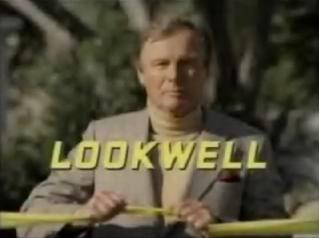Welcome to Retro Television Reviews, a feature where we review some of our favorite and least favorite shows of the past! On Thursdays, I will be reviewing Lookwell, which aired on NBC in 1991. The entire show is currently streaming on YouTube!
Adam West is an actor who solves crimes …. kind of.
Episode 1.1 “Lookwell”
(Dir by E.W. Swackhamer, originally aired on July 28th, 1991)
Ty Lookwell (Adam West) was once the biggest star in Hollywood.
Well, maybe not the biggest star. But, in the 70s, he did have his own cop show. It was called …. Banacek? Mannix? No, that’s not it. Oh …. BRANNIGAN! Ty Lookwell starred on a show called Brannigan and he was even given his own honorary police badge in 1972. It was presented to him at a ceremony in Television City.
However, nearly 20 years later, things have changed. Brannigan is no longer on the air and Ty Lookwell has been reduced to wearing a wig and a leather jacket in an attempt to get a role in a revival of Happy Days. (He not only doesn’t get the role but he doesn’t even get to audition.) When he returns to his home, he is informed that his favorite hairspray has been discontinued (“Those fools!”) and that all the messages on his machine are for his nephew. Kevin Costner calls looking for Lookwell’s nephew. Francis Ford Coppola calls for Lookwell’s nephew and leaves a message in which he promises to call back. No one calls for Ty Lookwell.
Lookwell, however, still has a steady gig teaching an acting class and his students not only look up to him but also help him out whenever he decides that there’s a crime he has to solve. This apparently happens frequently as Lookwell takes his honorary badge very seriously.
“Remember how we talked about how you don’t have to come around here?” Detective Kennery (Ron Frazier) asks Lookwell at one point.
The pilot follows Lookwell as he investigates a series of car thefts. Helping him out is his favorite student, Jason (played by future director Todd Field). Lookwell’s investigative techniques are not particularly complicated. He puts on a disguise and attempts to go undercover. It never quite works, largely because everyone that Lookwell meets is smarter than Lookwell. Lookwell’s attempt to disguise himself as a Grand Prix racer fails because the security guard takes one look at him and sees that he’s obviously not a Grand Prix racer. His attempt to conduct a stakeout on a fancy diner is nearly thwarted by his bizarre decision to disguise himself as a hobo. His attempt to go undercover at a garage is thwarted by the other mechanics misunderstanding his leading questions.
(“Who beat you up, Mr. Lookwell?” his students ask at the start of class.)
As the investigation continues, Jason wonders if they’re just wasting time.
“You do not waste time,” Lookwell corrects him, “Time wastes you.”
Lookwell was written by Conan O’Brian and Robert Smigel, long before either one of them became famous, and the humor is definitely the humor of a generation who grew up watching network television, especially the cop shows of the 70s and the 80s. While the dialogue is clever and definitely funny, it’s really Adam West who makes the pilot work. West delivers all of his line with such conviction and confidence that it doesn’t matter that he only plays a peripheral role in solving the case and, in fact, usually makes things worse for everyone involved. As played by West, Lookwell is so confident in his abilities and so blithely unaware of his limitations that it’s hard not to admire his spirit.
Unfortunately, the spirit was not admired by NBC and Lookwell only aired once. But it has since developed a cult following. Adam West described it as being his favorite of the various shows that he did. I enjoyed the pilot, though I do think the premise was perhaps a bit too thin to support an actual series. (It would have made a great recurring SNL bit, though.) Thanks to YouTube, everyone can now watch what NBC passed up.


